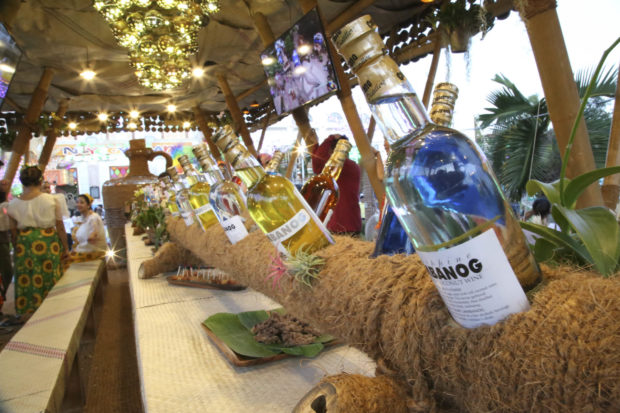
‘ALTERNATIVE DISINFECTANT’ The growing coronavirus scare—and the scarcity of rubbing alcohol in supermarkets— may just lead people to discover a nonrecreational use for this potent native drink. —DELFIN T. MALLARI JR.
LUCENA CITY—Rubbing alcohol having disappeared from store shelves as a result of public panic over COVID-19, some health authorities in Quezon province are convinced that the local coconut-based liquor, “lambanog,” could very well suffice.
“Lambanog is an alternative disinfectant to prevent the spread of the coronavirus,” Dr. Grace Santiago, Quezon health officer, told town officials and barangay and local health workers at an emergency meeting here on Thursday.
The meeting was called by Gov. Danilo Suarez to further strengthen the local government’s preventive steps and capabilities against the threat posed by COVID-19.
In fact, lambanog has long been a popular disinfectant among rural folk in Quezon, according to Fe Fernandez, a “manghihilot” (healer) in Barangay Cotta in the city.
‘Potent sanitizer’
“It is a more potent sanitizer and rejuvenating massage concoction if mixed with crushed ginger and certain herbs,” she told the Inquirer in Filipino.
When rubbing alcohol started becoming scarce due to the virus scare, the sale of lambanog spiked, according to “Larry,” a helper in a wine store at the city market
“With its 80 to 85-percent alcohol content, the buyers were using it as an effective disinfectant,” he said. “Besides, a bottle of lambanog is much cheaper compared to the 70-percent solution rubbing alcohol.”
A 320-milliliter bottle of lambanog sells for only P20. In comparison, a 500-ml bottle of branded rubbing alcohol regularly costs P84. With the current shortage, alcohol scalpers are selling at P250-P300 a bottle.
Shot in the arm
Lambanog is made from the dripping sap called “tuba” from the coconut flower.
The sweet and frothy tuba, a rejuvenating drink in itself, is made through a natural fermentation and distillation process that produces the native wine.
The sudden rise in lambanog sales is a shot in the arm of Quezon’s languishing wine industry.
Licensed distillers of lambanog in the province lost at least 80 percent of their earnings last Christmas as a result of cases of methanol poisoning and deaths attributed to the alcoholic drink.
Authorities suspected that the lambanog consumed by the victims was a mixture of toxic chemicals, including methanol, and not a product of the natural fermentation and distillation process used by legitimate producers.